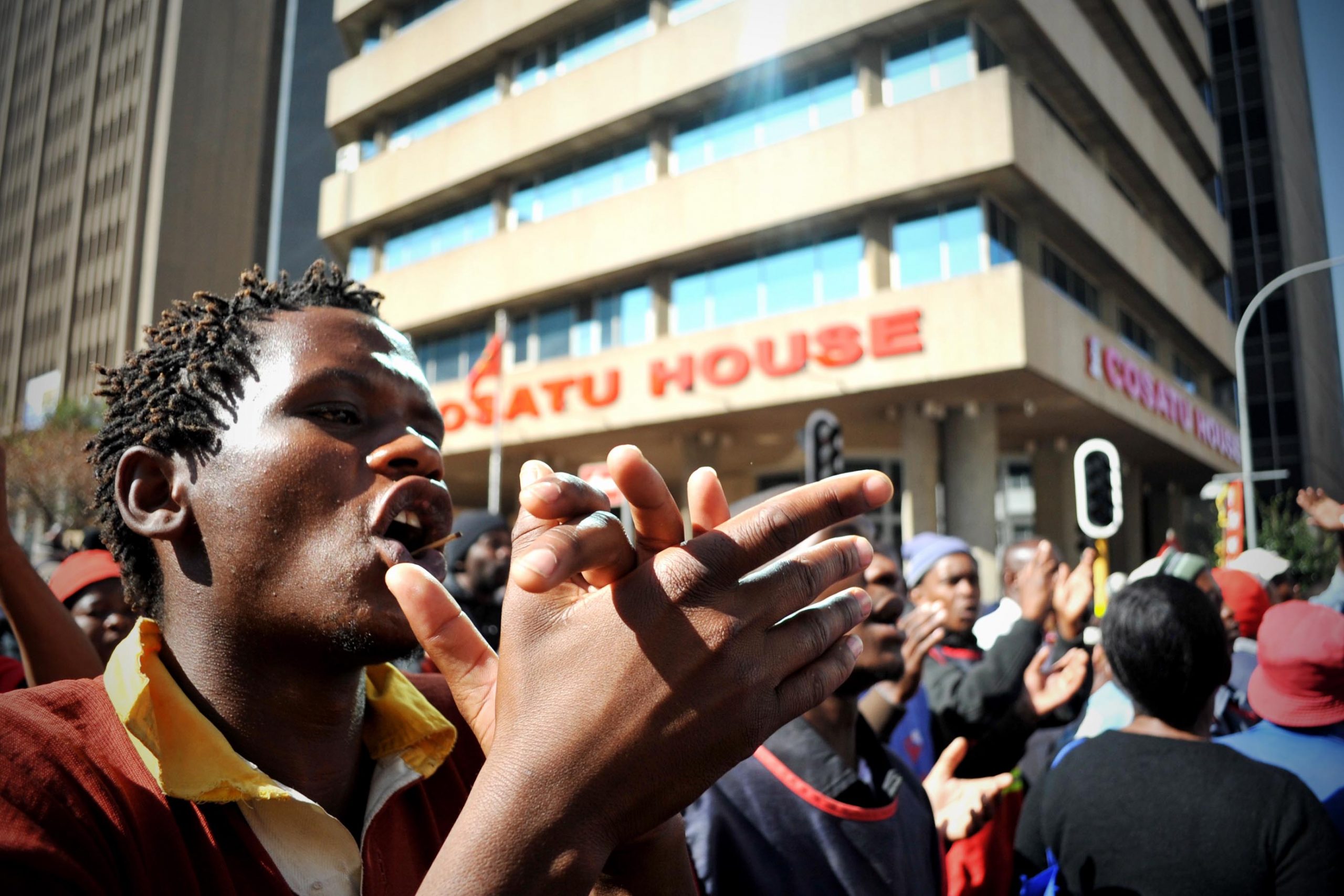Zero hours contracts are a poverty sentence
In South Africa’s long history of worker exploitation, zero hours contracts are the likely next chapter. But workers cannot afford to sit out a protracted legal process to expose them for what they…
Author:
6 March 2020

Many hoped that 2015 signalled a tectonic shift from misery to dignity for thousands of workers in South Africa. Amendments to labour legislation guaranteed that, once employed through a labour broker at a company for three months, a worker became that company’s permanent employee.
Those optimistic about the law’s power to change workers’ lives saw the amendments as a death knell to exploitative labour broking. But there were some who remained sceptical, pointing to employers’ impressive record of circumventing pro-worker legal reforms in the past.
If cases coming before the Commission for Conciliation, Mediation and Arbitration (CCMA) are anything to go by, the sceptics’ misgivings were well placed. Often a canary in the coal mine of the labour cases that eventually make their way before the Constitutional Court, the CCMA is increasingly hearing the cases of workers working under zero hours contracts.
Signs are that these contracts may be the next frontier of worker exploitation in South Africa.
Ground zero
What are zero hours contracts? Well, it’s in the name. Under these contracts, workers – usually formerly employed through labour brokers – are employed on a permanent basis at a company. They are not, however, guaranteed any working hours by the company. Instead, the company retains ad hoc powers to decide when it needs the workers. So it is conceivable, for instance, that a worker working under a zero hours contract could work 40 hours in one week, but none in the following three.
But the more important question is why zero hours contracts? They serve important functions for bosses. The first is that they allow them to monitor and tweak their wage bills as they see fit.
Related article:
Zero hours contracts are also used to divide and discipline workers. So when zero hours workers resist their conditions of employment – saying that the 2015 legislation amendments entitle them to the same working hours and benefits as their permanently employed colleagues – employers claim the demands are threatening the company, and the jobs of permanent workers. The divisive effects among low-wage work forces are devastating.
And consider how much easier discipline is made by zero hours contracts. Instead of the bureaucratic headache of a suspension, employers are now able instead to deny workers working hours. Simple.
The true cost of zero hours contracts, however, lies in their unintended consequences.
As an example, take the Ferrero plant in southern Gauteng, the world’s second-largest chocolate confectionery. Holding a job for a decade is usually a sure sign of security and even upward mobility. For Ferrero workers under zero hours contracts, it has been anything but.
Related article:
Many of the mostly women workers began their Ferrero careers renting homes built from brick and sending their children to school every morning on buses. But as their conditions of employment were converted to zero hours, and they lost the dependability of a set number of working hours, so the ability to budget – for rent, for school fees, for savings – became impossible. After a decade in the job, some have now moved into shacks, while their children walk to school.
But if zero hours work is a new frontier in worker exploitation, it also resembles some of the older tricks in the book.
The next moment of division?
South Africa’s industrial relations framework emerged from a series of violent strikes led by white workers in the early 1920s, culminating in the Rand Revolt. More or less ever since, there has existed a fundamental discontinuity in who exactly is a worker in South Africa. On one side of the divide are full-time, permanent employees. The rights-bearing worker. On the other side, various types of “unskilled” or “general” workers.
The first legal definitions of “employee”, for instance, excluded “pass-bearing natives”. The growth of black employment in South Africa’s cities changed that. But, throughout apartheid, new dimensions were added to these divisions. “Part-time work”, for instance, and “casual work”, which included the temporary workers brought in to break strikes – amacasual.
In the aftermath of the 1979 Wiehahn Commission recommendations – the moment in which “employee” was finally meant to be unified in law – a crucial further split was introduced: labour broking. This established a trend in South Africa’s labour law: the legal unification of workers has always produced their externalisation.
Related article:
Amendments to labour law after apartheid continued the trend. Labour broking was allowed to proliferate in the 2000s precisely because of the law. Provisions requiring labour brokers to register with the Department of Labour were removed along with clauses that held client companies liable for unfair labour practices and dismissals of labour broker workers.
Zero hours workers – the most recent entry in a grim record stretching from “pass-bearing natives”, through “amacasual” and eventually to labour broker workers – are no different. Zero hours work is but one of the means of externalisation emerging from the 2015 legislative efforts to unify workers.
Zero is not the only number
Quantifying the devastation of labour broking in South Africa has been nearly impossible. However, new income tax administrative data released in 2015 by the South Africa Revenue Service and the National Treasury, including which companies are labour brokers and the wages of their individual employees, is starting to reveal some of the picture.
The data shows, for instance, that in the four years leading up to the 2015 amendments to South Africa’s labour laws, there was a “wage penalty” of 30% for workers employed through labour brokers. That means that, simply by virtue of working for a labour broker, those workers earned almost a third less than their permanently employed peers. And here’s the kicker: 80% of that wage penalty can be explained by the benefits that were denied to labour broker workers.
Related article:
The picture becomes worse when we consider that unions have largely failed to organise labour broker workers, leaving the lives of a growing proportion of South African workers at the mercy of profit-driven employers.
In South Africa, the union membership and protections that labour broker workers have been denied remain sure measures of workers’ wages. A recent analysis by Tim Köhler, a development economist at the University of Cape Town’s development policy research unit, shows that of the bottom half of the country’s earners, only 15% were union members in 2017. By contrast, half of the richest 20% of earners were union members.
When jobs are the problem
In the absence of a labour movement with the might to dictate a legal regime that would uphold workers’ dignity, the courts remain, for now, the only terrain on which to contest zero hours work. Workers continue to be implicated in the system they would transform, and it in them.
Labour broking was introduced in the early 1980s. But when its lawfulness was eventually tested in the Constitutional Court in 2018, Chief Justice Mogoeng Mogoeng ridiculed the legal team for labour broker Assign Services for arguing that there was any dignity in labour broking. Unions had done their groundwork. They ensured that, whether on the pages of the country’s broadsheets or on the bench of its apex court, “labour broking” had an acidic, embarrassing ring to it.
Nevertheless, it took two decades before labour broking became a dirty word. Zero hours workers cannot afford similar delays. The responsibility falls to South Africa’s progressive forces to ensure that by the time zero hours contracts eventually have their day in court, they have been fully tarred for the atrocity that they are.
Under zero hours contracts – which workers are mostly starved into accepting – work is hollowed of the dignity it has traditionally guaranteed. So, calling zero hours work what it is will mean accepting that some prized insights into the South African economy are rubbish. Jobs are the economic miracle we’re after, apparently. They pay. They provide a path out of poverty. Well, often, they don’t.




